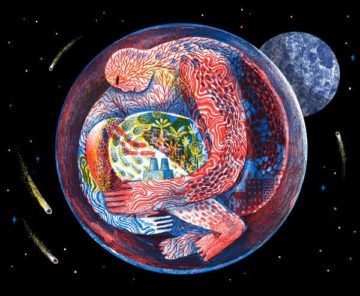Hope Jahren in Nautilus:
 There exists a social hierarchy within science that strikes people who are not mixed up in it as ridiculous. It goes like this: Mathematicians are superior to Physicists, who are, in turn, superior to Chemists, who are of course, superior to Biologists. There’s also a pecking order within each of these disciplines. Take biology, for example: Geneticists are superior to Biochemists, who are superior to Ecologists. The system breaks down when we come to sociology, psychology, and anthropology and devolves into a debate as to whether the social sciences are really Sciences after all. Scientists arguing about whether a science qualifies as Science is more common than you might think. Zoom in, and you’ll see scientists arguing about who does (and doesn’t) qualify as a Scientist. Within the last five decades or so, it is generally accepted that more and more women have become Scientists, which implies that if we look back in time, there were fewer and fewer. This ultimately begs the question: Who was the first Woman Scientist?
There exists a social hierarchy within science that strikes people who are not mixed up in it as ridiculous. It goes like this: Mathematicians are superior to Physicists, who are, in turn, superior to Chemists, who are of course, superior to Biologists. There’s also a pecking order within each of these disciplines. Take biology, for example: Geneticists are superior to Biochemists, who are superior to Ecologists. The system breaks down when we come to sociology, psychology, and anthropology and devolves into a debate as to whether the social sciences are really Sciences after all. Scientists arguing about whether a science qualifies as Science is more common than you might think. Zoom in, and you’ll see scientists arguing about who does (and doesn’t) qualify as a Scientist. Within the last five decades or so, it is generally accepted that more and more women have become Scientists, which implies that if we look back in time, there were fewer and fewer. This ultimately begs the question: Who was the first Woman Scientist?
Was it Marie Curie? She discovered the element radium, and later polonium, near the end of the 19th century. Does she count? After all, she viewed herself as more of an Artist: “The scientific history of radium is beautiful. And this is proof that scientific work must be done for itself, for the beauty of science,” she wrote in 1921. Was it Émilie du Châtelet? She formulated the existence of infrared energy. Does she count? She apologized often for not knowing how to say what she wanted to say. “I use everyday words here in contravention with propriety but cannot avoid the too-frequent return of the same word because, technically, there are both things and not-things that we call Fire,” reads a footnote on the very first page of her dissertation, written in 1758.
Was it Hypatia of Alexandria? She developed the mathematical technique of long division, which was cutting-technology during the fifth century A.D. Does she count? Hypatia taught men of great influence and highest government, and was eventually stripped, stoned, torn to pieces, and burnt to ashes for her trouble. Suidas, the 10th-century author of the first encyclopedia, devoted most of Hypatia’s entry to the debate over whether she died a virgin.
Was it the Neanderthal female whose name has been lost to time?
More here.
